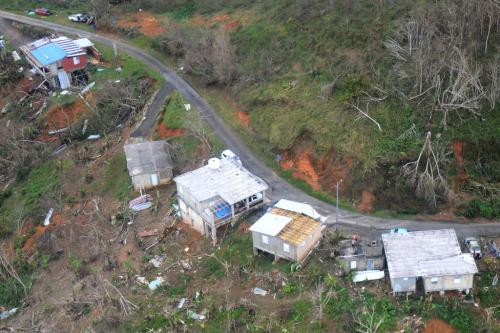UN experts sound alarm on mounting rights concerns in Puerto Rico in wake of Hurricane Maria
More than a month after Hurricane Maria devastated Puerto Rico, the island remains without an effective emergency response, a group of United Nations human rights experts warned on Monday, as they called on United States and Puerto Rican authorities to remove regulatory and financial barriers to reconstruction and recovery.

Residents wave from the roof of a house, bottom right, in Jayuya, Puerto Rico, 14 October 2017, to signal for help.
“The hurricane has aggravated the island's existing dire situation caused by debt and austerity measures,” the experts said in a news release issued by the Office of the UN High Commissioner for Human Rights (OHCHR), calling conditions “alarming” for the 3.5 million residents in the US territory.
“Thousands of people are displaced, with homes destroyed, and without any relief in sight. More than 80 per cent of the population, or close to 2.8 million people, continue to live without electricity. Few hospitals are functioning. There are allegations that the water available ¬–for those who have access to it – may be contaminated,” the experts elaborated.
“With winter approaching, we call for a speedy and well-resourced emergency response that prioritizes the most vulnerable and at risk – children, older people, people with disabilities, women and homeless people,” they stressed.
The Independent Expert on foreign debt and human rights, Juan Pablo Bohoslavsky, said that “even before Hurricane Maria struck, Puerto Rico's human rights were being massively undermined by the economic and financial crisis and austerity policies, affecting the rights to health, food, education, housing, water and social security.”
The experts maintained that even before the hurricane struck, nearly half of Puerto Rico's population were living below the poverty line.
“We can't fail to note the dissimilar urgency and priority given to the emergency response in Puerto Rico, compared to the US states affected by hurricanes in recent months,” pointed out Leilani Farha, Special Rapporteur on the right to housing.
“After a natural disaster, with around 90 thousand homes totally destroyed, people are at their most vulnerable. It's the obligation of all levels of government to act to protect them, and to ensure that lives can return to some normality quickly. People need safe and adequate homes – temporary and long-term – with electricity, clean drinking water and sanitation facilities” she stressed.
The Special Rapporteur on the right to food, Hilal Elver, highlighted: “Hurricane Maria wiped out most of the island's crops. Banana and coffee – the Island's most valuable exports – were the hardest hit. The population is facing immediate food shortages but also long-term consequences from the destruction of the entire agricultural infrastructure.”
“We call on the United States and Puerto Rican authorities to remove regulatory and financial barriers to reconstruction and recovery,” they stated. “All reconstruction efforts should be guided by international human rights standards, ensuring that people can rebuild where they have lived and close to their communities. Reconstruction should aim to increase the resilience of Puerto Rico's infrastructure, housing and hospitals against future natural disasters.”
They also stressed the need for debt relief for the island, which filed for bankruptcy in May 2017 under the Puerto Rico Oversight, Management and Economic Stability Act. A federal court in San Juan has begun hearings over the biggest public debt restructuring in US history.
Special Rapporteurs and independent experts are appointed by the Geneva-based UN Human Rights Council to examine and report back on a specific human rights theme or a country situation. The positions are honorary and the experts are not UN staff, nor are they paid for their work.
Source:United Nations
- 217 reads
Human Rights
Ringing FOWPAL’s Peace Bell for the World:Nobel Peace Prize Laureates’ Visions and Actions

Protecting the World’s Cultural Diversity for a Sustainable Future

The Peace Bell Resonates at the 27th Eurasian Economic Summit

Declaration of World Day of the Power of Hope Endorsed by People in 158 Nations

Puppet Show I International Friendship Day 2020

